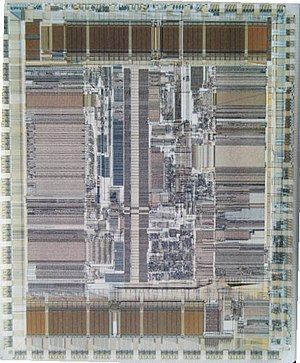DEC Alpha
DEC Alpha is a microprocessor architecture designed by DEC and introduced in 1992 under the name AXP, as a replacement for the VAX series. It has a 64-bit RISC instruction set specially oriented to floating point calculations.
The Alpha architecture is characterized by following the RISC (Reduced Instruction Set) philosophy. The first processor to display Alpha technology was the 21064.
The organization of its records is general purpose with an architecture that can be framed as record-record. This causes most of its instructions to operate on registers, using RAM only for load and store instructions. The reason is that we try to minimize memory accesses, since they represent the bottleneck for current processors. The word length of the registers is 64 bits, either from the PC (program counter), through the integer registers, floating point, etc.
It is set up to handle 64-bit data, but it can also handle 32-bit, 16-bit, and finally 8-bit data.
Versions
The first version, the Alpha 21064 was released in 1992 running at 200 MHz.
The 64-bit processor was a super-piped and superscalar design, like other RISC designs, but nevertheless outperforming them all and DEC promulgated it as the world's fastest processor.
In comparison, the lower-cost Intel Pentium came out at 66 MHz at launch that spring.
The Alpha 21164 became available in 1995 at a frequency of 333 MHz. In July 1996 it was raised to 500 MHz, in March 1998 to 666 MHz, and in May 1998 the 21264 was released at 731 MHz. The 1 GHz, and faster ones, were announced in 2001 (the 21364 or EV7), and were available from 2003 at 1.1 GHz+. Around 500,000 Alpha-based systems were sold by the end of 2000.
Production of the Alpha chips was licensed to Samsung. Compaq's subsequent purchase of DEC brought the products mostly under the API NetWorks, Inc. (formerly Alpha Processor Inc.), a company founded by Samsung and Compaq. In October 2001 Microway began the exclusive sale and provision of services for the API NetWorks' Alpha line. Later Compaq announces that computers using Alpha would undergo a change in favor of Intel's Itanium in 2004.
HP, the new owner of Compaq, later announces that support would continue for several more years, including the release of the EV7z chip (EV79 and EV8 both cancelled), but this would be the last instance of the chip. The IA-64 is a replacement for this series. HP will continue to support and sell Tru64 through 2006, and has extended support through 2011.
Ironically, in mid-2003 when it was planned to be retired, the Alpha topped the list of fastest computers in the United States. On August 16, 2004, HP announced the launch of the EV7z at 1.3 GHz, and that this It is the last Alpha model that they are going to produce.
Table of models
| Model | Nickname | Year | Frequency [MHz] | Process [μm] | Transistors [millions] | Superf [mm2] | IO Pines | Consumption [W] | Voltage | Mem [MB/s] | Dcache [k] | Icache [k] | Scache | Bcache | ISA |
|---|---|---|---|---|---|---|---|---|---|---|---|---|---|---|---|
| EV40 | 21064 | 1992 | 150-200 | 0.75 | 1.68 | 234 | 290 | 30 | 3.3 | 80 | 8 | 8 | -- | ||
| EV450 | 21064A | 1994 | 200-300 | 0.5 | 2.85 | 164 | 33 | 3.3 | 80 | 16 | 16 | -- | |||
| LCA40 | 21066 | 1993 | 100-166 | 0.68 | 1.75 | 209 | 21 | 3.3 | 30 | 8 | 8 | -- | |||
| LCA450 | 21066A | 1994 | 166-233 | 0.5 | 1.75 | 161 | 23 | 3.3 | 30 | 8 | 8 | -- | |||
| EV50 | 21164 | 1995 | 266-500 | 0.5 | 9.7 | 299 | 296 | 56 | 3.3/2.5 | 150 | 8 | 8 | 96k | 1 | R |
| EV560 | 21164A | 1996 | 400-767 | 0.35 | 9,3 | 209 | 46 | 3.3/2.0 | 300 | 8 | 8 | 96k | 1-2M | R,B | |
| PCA560 | 21164PC | 1997 | 400-533 | 0.35 | 3.5 | 141 | 264 | 40 | 3.3/2.5 | 8 | 16 | -- | 1M | R,B,M | |
| PCA570 | 600-666 | 0.28 | 5.7 | 101 | 283 | 20 | 2.5/2.0 | 16 | 16 | -- | 1M | R,B,M | |||
| EV60 | 21264 | 1998 | 450-600 | 0.35 | 15.9 | 314 | 389 | 73 | 2.0 | 1600 | 64 | 64 | -- | 2-8M | R,B,M,F |
| EV670 | 21264A | 1999 | 667-750 | 0.25 | 15.9 | 210 | 389 | 64 | 64 | -- | 2-8M | R,B,M,F,C | |||
| EV68A0L | 21264B | 2001 | 800-833 | 0.18 | 15.9 | 125 | 64 | 64 | -- | 2-8M | R,B,M,F,C,T | ||||
| EV68CB0 | 21264C | 64 | 64 | -- | 2-8M | R,B,M,F,C,T | |||||||||
| EV68CXUD0US21264D | 64 | 64 | -- | 2-8M | R,B,M,F,C,T | ||||||||||
| EV7 | 21364 | 2003 | 800- | 0.18 | 64 | 64 | 1.75M | -- | R,B,M,F,C,T |
ISA Extensions:
- R: ?
- B: BWX, instructions for reading 8- and 16-bit memory words
- M: MVI, instructions "multimedia"
- F: FIX, instructions to move data between whole and floating log pointers and for square root
- C: CIX, commands to count and locate bits
- T: Pre-selection support with modification trying to improve the performance of the first block attempt
Contenido relacionado
Pascal (programming language)
Microsoft encarta
KHTML

